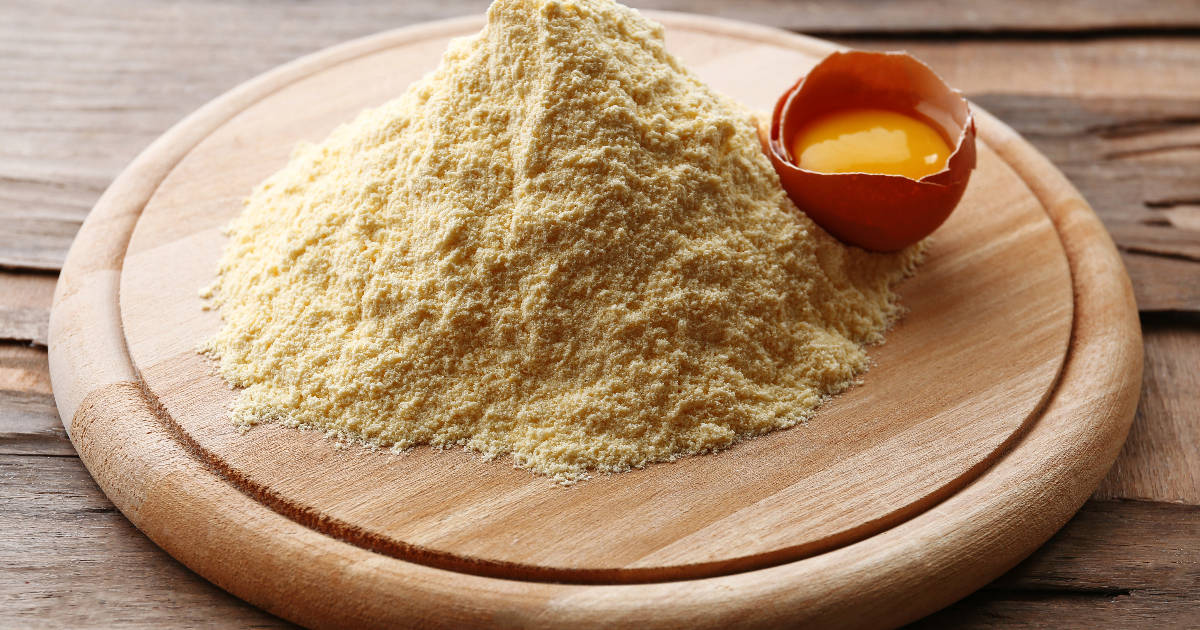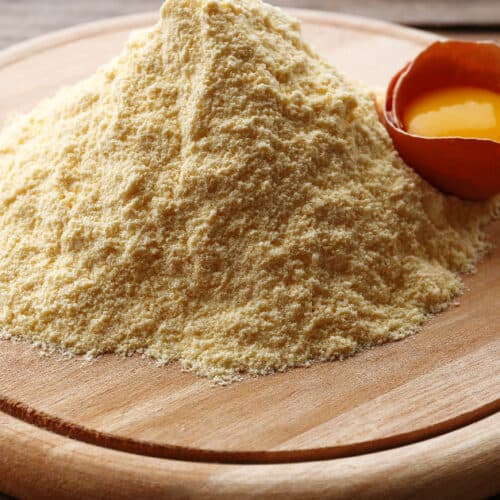Egg powder, also known as dried or dehydrated eggs, is simply fresh eggs that have been cracked, beaten, and then dehydrated to remove moisture and turn them into a powder.

Egg powders can make a handy ingredient to have on hand for camping trips, survival situations, and long-term food storage.
They have a long shelf life when properly stored and can be easily reconstituted into something resembling a fresh egg when water is added back in.
Here are some of the biggest benefits of making your own powdered eggs rather than buying them:
- Use Fresh, High-Quality Eggs: By making them yourself, you can ensure you are using only the freshest eggs from sources you trust. This avoids concerns some people have over the quality and age of eggs used in commercial powdered egg production.
- Save Money: Though ready-made powdered eggs are available to buy, making your own at home using eggs you already have on hand is far less expensive.
- Make Use of Abundant Eggs: If you live on a homestead with chickens, you may get huge booms and busts in egg production over the course of a year. Powdering them yourself allows you to preserve extra eggs during peak laying times.
- Long-Term Storage: Properly stored powdered eggs can last 5 years or more, allowing you to build up a long-term reserve of this nutritious food.
- More Nutritious: Since powdered eggs contain no moisture, they retain most of the protein, vitamins, and minerals of fresh eggs despite being shelf-stable. Each tablespoon of powder provides the equivalent nutrition of one whole egg.
- Lightweight & Compact: Powdered eggs take up far less storage space than fresh eggs and are easier to transport if backpacking or hiking since nearly all the weight is from water.
- Emergency Food Supply: Egg powders are a smart addition to any prepper's emergency food stockpile given their nutrition, lightweight nature, and long shelf life.
Key Takeaway: Making your own powdered eggs allows you full control over the freshness and quality of the eggs used.
Equipment Needed to Make Powdered Eggs
While the process of making powdered eggs is quite straightforward, you will need some basic kitchen equipment:
- Blender: Used to mix up raw egg liquid and render dried eggs into powder. Any typical countertop blender will work fine.
- Dehydrator: The key piece of equipment for drying out egg liquid into dried eggs. Oven drying can work but is far more difficult and inconsistent.
- Mixing Bowl: Needed for transferring eggs into after dehydrating and collecting dried egg crumbs before rendering into powder.
- Ladle or Spoon: For carefully transferring liquid egg mixture from blender onto dehydrator trays.
- Storage Containers: Powdered eggs will last longer when stored in airtight containers like mason jars or vacuum sealed bags.
- Fork or Butter Knife: Helpful for gently scraping dried eggs off of dehydrator trays.
And of course, the key ingredient:
- Fresh Eggs: The freshest highest-quality eggs will produce the best and safest powdered eggs. Farm-fresh eggs are ideal if available.
Step-By-Step Guide to Making Powdered Eggs

Egg Powder Recipe
Ingredients
- 2 dozen fresh eggs
- Water (for reconstituting later)
Instructions
Prepare Equipment
- Thoroughly wash and sanitize any equipment that will contact the eggs during the powdering process. This includes blender containers, mixing bowls, dehydrator trays, ladles/spoons, and storage containers.
Crack Eggs into Mixing Bowl
- Crack the 2 dozen eggs directly into a clean mixing bowl, being careful not to get any eggshell pieces or other debris in the bowl. Use a fork to gently fish out any stray bits that fall in.
Transfer Eggs to Blender & Mix
- Pour the 2 dozen cracked eggs from the mixing bowl into your blender. Blend at medium speed for 2 minutes until the egg liquid is light, frothy, and well mixed. For smaller blenders, you may need to blend in 2 batches.
Ladle Eggs onto Dehydrator Trays
- Place rimmed fruit leather trays or solid dehydrator trays into your food dehydrator to hold the egg mixture. Carefully ladle the foamy egg liquid from the blender into the trays, spreading it out evenly in a thin layer.
Dehydrate the Eggs
- Run your dehydrator at 135-145°F until the eggs are completely dried out, usually 8 to 12 hours. The egg mixture will be lightly browned, cracked looking, and brittle when fully dehydrated.
Transfer Dried Eggs to Mixing Bowl
- Once dried, use a fork or butter knife to gently scrape the dried egg bits off each tray and into your clean mixing bowl. Take care not to spill any.
Process Dried Eggs into Powder
- Pour the dried egg pieces from the mixing bowl into your blender and mix at medium speed for 1-2 minutes until a fine, powdery flour forms.
Store Properly for Long-Term Use
- Transfer finished powder into airtight jars or vacuum sealed bags. Store in a cool, dark place like a pantry for up to 2 years. For even longer storage up to 5 years, consider freezing.
- And that's it! With just a few basic pieces of kitchen equipment and fresh eggs, you can easily make nutritious egg powder for camping trips, emergency supply stocks, or everyday use.
- When ready to eat, mix the powder with water at a 1:2 ratio (1 Tbsp powdered egg + 2 Tbsp water = 1 large egg) and use like fresh scrambled eggs. The powder also works great in place of eggs called for in recipes.
Storing Powdered Eggs for Maximum Freshness
Proper storage is key to keeping homemade powdered eggs safe and shelf-stable for as long as possible. Here are some top tips:
- Store in sealed airtight containers like mason jars or vacuum sealed bags. The drier the storage method, the better.
- Keep powder in a cool, dark place like a pantry to prevent light exposure and temperature fluctuations.
- For long-term storage spanning years, consider freezing finished powder. Use only freezer-safe containers.
- Once opened, powder stored in the fridge will last longer before quality degrades. Use within 6 months.
- If any oils, fats, or moisture get mixed in during production or storage, expect greatly reduced shelf life to just weeks or months.
Properly stored powdered eggs can safely last 2+ years at room temperature or 5+ years in the freezer. Be sure to practice ideal s
FAQs
How long does homemade powdered egg last?
With proper airtight, low-moisture storage methods, homemade powdered eggs can safely last 5+ years in the freezer or 2+ years in a cool, dark pantry.
Do you have to cook powdered eggs before eating?
Yes, powdered eggs should always be cooked prior to consumption to eliminate any risk of foodborne illness, whether using commercially made or homemade versions.
Can powdered eggs be used in baking?
Absolutely! Powdered eggs work extremely well as a substitute for fresh eggs called for in recipes for baked goods like cakes, cookies, breads, muffins, and more.
What's the nutrition comparison to fresh eggs?
Since powdered eggs are made by simply dehydrating fresh eggs, they retain very similar vitamin, mineral and protein nutrition levels. The only thing missing is the water content.
Conclusion
From camping trips to emergency preparedness and everyday use, powdered eggs can be a handy staple to have on hand. While buying commercial versions is certainly an option, making your own powdered eggs at home has many benefits like full control over ingredient freshness and huge cost savings.
As you've seen, making DIY egg powder is also surprisingly easy using just a few basic pieces of kitchen equipment like a blender and electric dehydrator. In just about a day's time, you can create a nutritious egg product boasting a shelf life of multiple years.

